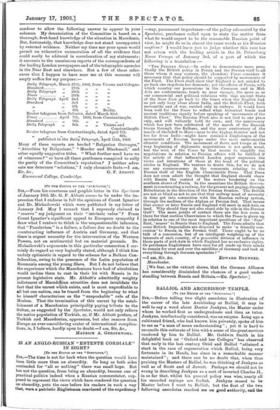IS AN ANGLO-RUSSIAN "ENTENTE CORDIALE" IN SIGHT ?
[To THE EDIT011 OP THE "SPECTATOR:1 SIR,—The time is not far back whenthe question would have been little more than an absurdity. So long as both sides contended for "all or nothing" there was small hope. But has not the question, from being an absurdity, become one of practical politics indeed when a Russian commentator, sup- posed to represent the views which have rendered the question an absurdity, puts the case before his readers in such a way that, were a patriotic Englishman convinced of the expediency —nay, paramount importance—of the policy advocated by the Spectator, perchance called upon to state the matter from what he would expect to be the reasonable Russian point of view, be might do so in almost the same words as his Russian confrere ? 1 would leave you to judge whether this case has not arisen with the leading article in the St. Petersburg Novoe Vremya of January 3rd, of a part of which the following is a translation :— "Tag PERSIAN GULP.—In order to demonstrate more prac- tically the British policy in Persia and the Persian Gulf to all those whom it may concern, the (London) Times considers it necessary that that policy should be supported by movements of the Fleet. The Fleet shall show that England is not minded to go back one step from her demands; yet the affairs of Persia, with which country our possessions in the Caucasus and in Mid- Asia are conterminous, touch us near enough, the more so as our commercial and political relations with that ancient State of the Near East go back to the times when the English had as yet only hazy ideas about India, and the British Fleet, both mercantile and of war, existed only in embryo. It would have been well for the Times to reflect what historical bonds and ancient traditions signify before speaking of 'movements of the British Fleet.' The Russian Fleet also is not tied to one place only, and will valiantly hold its own ; and the anniversary which has just been celebrated of the march of the Russian troops through the Balkans, and the near anniversary of the march of Skobeleff to Merv—near to the Afghan frontier and not too far from India—might have reminded Englishmen of the movements of Russian troops under the most unfavourable climatic conditions. The movement of fleets and troops at the very beginning of diplomatic negotiations is not quite usual, but the wish of the Times by that means to simplify the negotiations in relation to Persian affairs will be fulfilled if the article of that influential London paper expresses the views and intentions of those at the head of the political circles in England. We venture to doubt this, for we do not see any common-sense in the comments relating to the Persian Gulf of the English Chauvinistic Press. That Press does not even admit the thought that England should share with Russia the control of the waters bordering on the southern shores of Persia. In the meantime the British Govern- ment is constructing a railway, for the present not paying, through Beluchistan in the direction of the Persian frontier. The British are not so blind as not to see that that railway must of necessity , in time get into connection with the Russian railway system, through the medium of the Afghan or Persian link. That means that sooner or later Russia and England will meet in mid-Asia on land. Why should they not also stand side by side in the Persian Gulf ? The more points of contact there are the less room is there for that restless Chauvinism to which the Times is given up in relation to one of the most important questions of the Near' East, 'nearer' to Russia than to England. The Times admits that some British Imperialists are disposed to make 'a friendly con- cession' to Russia -in the Persian Gulf. There ought to be no talk of a concession, but of an intelligent weighing up of the interests of each country, of a peaceable division of influence in those parts of mid-Asia in which England has no exclusive rights. Or perchance Englishmen have once for all made up their minds to remain for ever and ever the satellites of Germany and look at everything through German spectacles ? "
Manchester.
[We fear, as the extract shows, that the German Alliance has considerably diminished the chances of a good under- standing between Russia and Britain.—En. Spectator.]










































 Previous page
Previous page